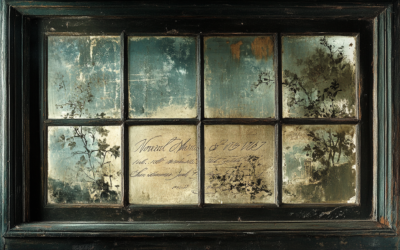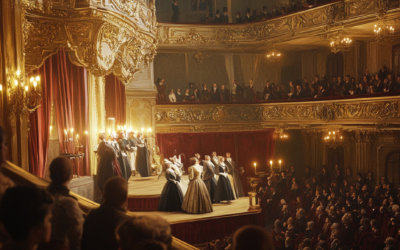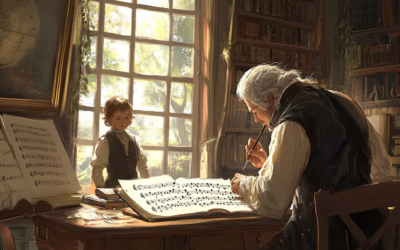Wolfgang Amadé Mozart
The Myth of Mozart's Childhood: Unmasking the Illusion
Mozart’s childhood is often romanticised, but behind the myth lies a more complex reality. This post explores the hidden dynamics within his family, questioning the traditional narrative of Mozart’s early years and shedding light on the forgotten role of his sister, Nannerl.
Mozart: The Fall of the Gods
This book offers a fresh and critical look at the life of Wolfgang Amadeus Mozart, challenging the myths that have surrounded him for centuries. We strip away the romanticised image of the “natural genius” and delve into the contradictions within Mozart’s extensive biographies. Backed by nearly 2,000 meticulously sourced citations, this work invites readers to explore a deeper, more complex understanding of Mozart. Perfect for those who wish to question the traditional narrative, this biography is a must-read for serious music lovers and historians.
“Mozart began to beat the keys on the harpsichord at three, play short pieces at four, and improvise Minuets at five. His father or sister copied the music that he was not yet able to compose. It is impossible to distinguish what actually came from his invention.”
Mozart: The Fall of the Gods
Mozart’s childhood is often shrouded in romanticised tales of prodigious talent and divine inspiration. Yet, when we look beyond the myths, a different picture begins to emerge—one that highlights contradictions and unspoken realities.
Born into a family where his father, Leopold, was a frustrated and unsuccessful composer, and his mother, Anna Maria, was of “Dinaric race” (as described by German nationalists), Wolfgang’s early years were shaped not by innate genius but by relentless familial expectations. Leopold’s ambition for fame found its outlet in his children, especially Wolfgang and his older sister Nannerl, who was also a talented musician, though her story has been largely overlooked.
Despite Nannerl’s early musical prowess, her contributions have faded into obscurity. Was she overshadowed by her younger brother, or simply a victim of the limitations placed on women in 18th-century society? Wolfgang himself once marvelled at one of her compositions, praising her talent, yet no trace of her work remains today. The focus on Mozart’s child prodigy image disregards the roles of those around him, particularly Nannerl, who may have played a significant part in shaping his development.
Mozart’s so-called “miraculous” early musical abilities were often exaggerated by biographers seeking to reinforce the myth of his genius. His father, keen to promote Wolfgang, carefully curated this image, often with the help of Nannerl, who would copy music that the young Mozart had yet to master. What remains unclear is how much of his early work was truly his own creation, and how much was a product of family collaboration.
You May Also Like
Mozart’s Illusory Triumphs
The story of the young Mozart’s so-called triumphs at the courts of Europe is a tale riddled with embellishments, half-truths, and fabrications—many courtesy of Leopold Mozart himself and those who later sought to mythologize his son. One such example is the visit to Munich on 12 January 1762.
The Vienna Disaster
The failure of La Finta Semplice in Vienna was a turning point for the Mozart family, revealing the cracks in the facade of Wolfgang’s prodigious reputation and prompting a desperate escape to Italy in search of redemption.
From Innsbruck to Bolzano
From Innsbruck to Bolzano, the Mozart family’s journey was a blend of strategic networking and missed opportunities, revealing the challenges of securing fame in 18th-century Europe.
The Myth of Mozart’s Sight-Reading Genius
Mozart’s so-called sight-reading miracles were less about supernatural talent and more about clever improvisation, as two key 18th-century witnesses make clear.
The Hidden Legacy of Michael Haydn
Mozart’s Symphony No. 37, K.444, is more Haydn than Mozart. How did this happen? A story of deception and misattribution unfolds.
The Myth of Mozart’s Education
For centuries, Wolfgang Amadeus Mozart has been celebrated as a musical prodigy, effortlessly composing masterpieces from a young age. However, when we peel back the layers of myth surrounding his early education, a different picture emerges—one in which his father, Leopold Mozart, plays a far more controlling and influential role than is often acknowledged. This article explores the true nature of Mozart’s education, examining how much of his early works can be attributed to his own genius, and how much was the product of his father’s meticulous and often self-serving guidance. Was Wolfgang’s brilliance entirely his own, or was it a crafted image designed by Leopold?







